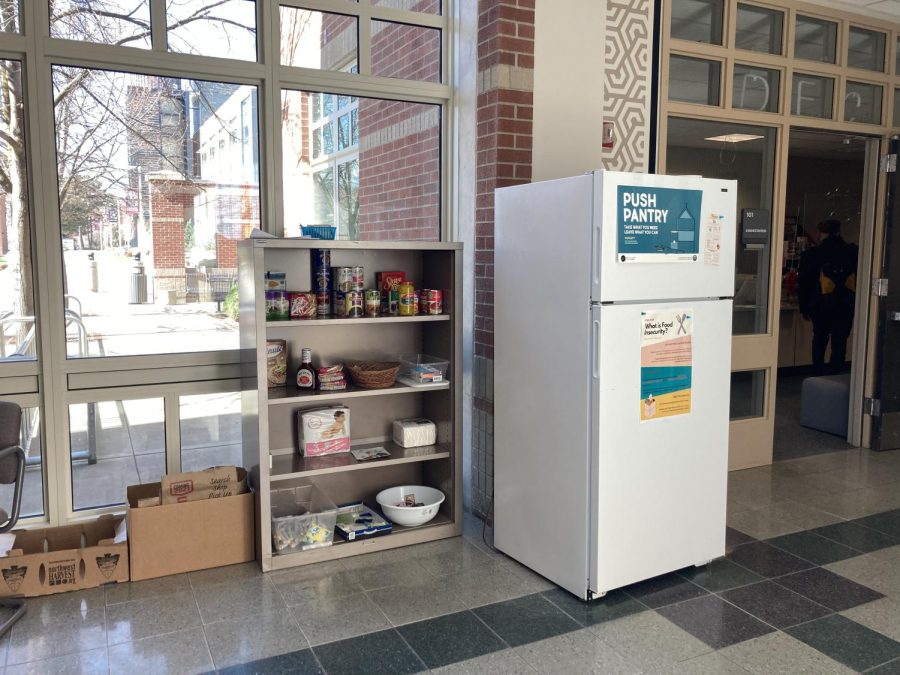PUSH connects CWU students with resources
April 13, 2022
Twenty-nine percent of college students attending a four year institution reported food insecurity within the previous 30 days according to the Hope Survey. The president of President’s United to Solve Hunger (PUSH), Jaeda Nelson, said, “This year, the mission of PUSH is to raise awareness and provide access to resources to anyone in the student community in a way that’s non-invasive.” For instance, PUSH aims to avoid limiting the amount of items students can take.
Students and members of the community in need can pick up food from Brooks Library, which contains the PUSH pantry, and Black Hall.
The pantry hours are Monday to Friday, 11 a.m. to 4 p.m. The hours are currently limited due to donations and availability of volunteers.
PUSH has several additional pick-up points that, such as the student government office, that are managed by external parties. For example, the student government has their own members collect donations, which is separate from PUSH but supports the same mission.
Nelson reported that since the beginning of the school year, 60 volunteers have supported the initiative. A lot of student volunteers are members of the nutrition program, which requires volunteer experience to graduate.
Nelson said PUSH has helped 611 students since October of last year, with a 40% return rate, meaning 40% of first time students returned for additional resources.
Guests are checked in with their connection cards, for data purposes, but the goal isn’t to track students or be invasive.
Volunteering
Anyone from any major program is able to volunteer. Members are trained which makes them eligible to participate for the school year. Training can be completed in around 45 minutes and focuses on food safety and operations.
Nelson recommends students reach out to PUSH through Instagram @cwupush, and look for flyers and pamphlets around campus to learn about what is happening.
Nelson described one of the major barriers for PUSH as lack of communication about the program and what resources are available to them, particularly between students and the university. Stigma may also play a role in reducing students’ ability to access resources.
“There’s a lot of different groups on campus that don’t have access to resources that they should have,” Nelson said.
PUSH aims to remove barriers and provide resources and opportunities, whether students lack access to food or are looking for the opportunity to serve other students through volunteering.
Food Recovery Program
Prior to COVID-19, PUSH used to have a food recovery program, partnering with Dining Services, accepting unsold grab-and-go items such as sandwiches from the C Store. However, with COVID reducing amounts of students and overall waste, this initiative was stopped.
Elizabeth Adkins, the operations support manager of Dining Services, mentioned that Dining Services is planning on partnering with PUSH to donate uneaten food from Holmes Dining to students in need.
“If we have any leftover usable food, we will often blast-chill it and we’ll repackage it and we’ll send it directly to the Wildcat pantry,” Adkins said. “The new recovery program that we’re putting out in more full force is going to be anything out of Holmes Dining, so anything that has not been guest-facing for a long period of time or anything that hasn’t come into contact with multiple utensils can be repackaged.”
Adkins said the program began in 2020, and evolved from only grab-and-go items to include items from Holmes.
“We noticed that we had a significant amount of food left over and we didn’t want to have to throw that food out so we saw an opportunity to help PUSH out and donate the food to them to ensure that that food was going to students,” Adkins said. “We’re focusing on more green initiatives and composting, we don’t like wasting food and we saw this as an opportunity to not only cut down on food waste but help our student body and our campus community.

